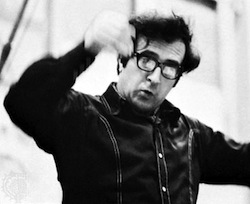Mira’s love of box-sets (or at least large spines) continues with the second set of Berio Sequenzas I have (on Mode records with other solo pieces), and she also grabbed the DG 20/21 recordings of ‘Sinfonia’ and ‘Coro’.
When I first started grad school, Richard Karpen would gather all of his students together every other week for a group meeting, and often we would listen to a piece and read a score. ‘Coro’ was one of those pieces. The opening five or six minutes begins like a song for voice and piano, then explodes into more typical Berio orchestral colors. I don’t mean the word ‘typical’ here to sound disparaging… but Berio’s orchestral writing has a clear, crisp sound that is one of the more recognizable voices in 20th century writing. His orchestration is almost like some of the great jazz player’s sounds – you can hear Coltrane when he plays tenor sax, and Dizzy Gillespie is the only one that sounds like Dizzy Gillespie. And in the same vain Berio’s orchestral writing can be identified… such a pristine and clear musical voice, even when expressing complex and dense textures. While I had been sent to Berio to look at solo instrumental writing already (mostly through the ‘Sequenzas’), seeing his orchestral scores (and his vocal writing in this piece, which requires the singers to be seated within the orchestra) presented a number of challenges to me. I had just finished an orchestral work a couple years before during by BA at Berkeley, and thought that one of the things I would be doing a lot of at UW would be writing orchestra works. At this meeting, where we all listened to ‘Coro’, the question was thrown at us… ‘Is there anything left for the orchestra to say that is new?’ … and if there is, how do we do it?
I remember thinking that innovation needs work, and that I couldn’t believe that there is ‘nothing left for the orchestra to say’. And I still believe that. The reality that struck me later that year though, was which orchestras want to try and find that new language? Gerard Schwarz (the director of the Seattle Symphony) talked to the music students at UW that year as well, and when asked why he doesn’t program more new music (or even give readings) he given a simple response… he said that he loved programming new music and he listed a number of composers that he liked to program because ‘they gave the audience familiar yet new sounds’. In other words, any composer that may be trying to find something new to say with orchestra won’t be getting played in Seattle while Gerard Schwarz was conducting. It was all ‘new music’ with a romantic voice. As his tenure comes to an end, I wonder if that will change? Are there examples of other major orchestras that do take an adventurous view? How many in the US would even perform ‘Coro’, a work now 35 years old and almost conservative by modern avant-garde tastes? Can a piece like this survive if it isn’t getting played? Is the recording it’s end all be all?
So it is no wonder that most composers work on solo or smaller chamber works. Personally, it is how my work gets performed. I would love to dive into a work for orchestra, but I also can’t imagine working on a piece that may never get played. While ‘Coro’ is a rarity in the concert hall, and we have to rely on a couple of versions to get an idea of what can be done with the work as far as interpretation goes, the Sequenzas have had a much more successful concert life. This second set I have features performances by Stuart Dempster (who the trombone Sequenza was written for) as well as Garth Knox and Irvine Arditti. Some wonderful playing in this set to say the least.


